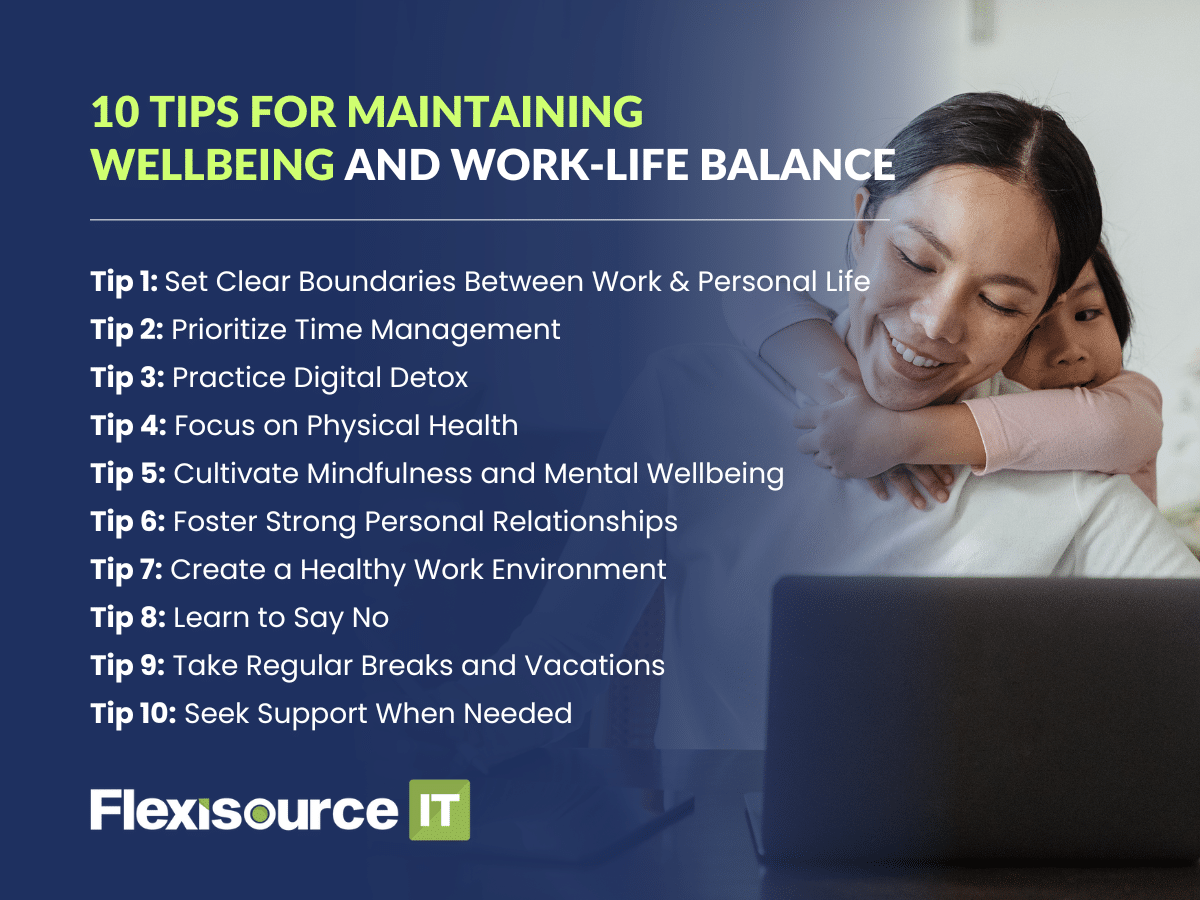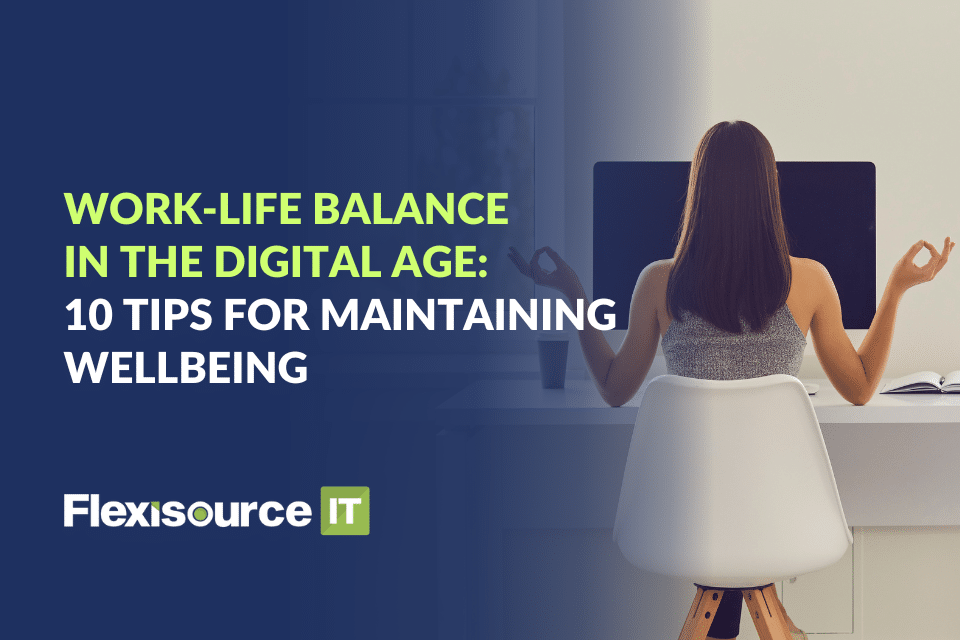As more companies embrace remote work and work from home, work and personal life boundaries have become increasingly blurred. Many workers find it challenging to maintain a healthy work-life balance. While technology offers convenience and efficiency, it also makes it difficult to truly disconnect, leading to burnout, stress, and a decline in overall well-being.
As a company catering to remote workers, Flexisource IT understands the importance of maintaining well-being in the modern workforce. Thus, this article explores ten effective tips for maintaining well-being in the digital age, empowering you to create a work-life balance that fosters both professional success and personal happiness.
What is the significance of work-life balance in remote settings?
Work-life balance is not just a buzzword; it’s a crucial component of a fulfilling life. Managing professional responsibilities without compromising personal well-being is key to a balanced and healthy life. Without a clear division between the office and home, remote workers often feel “always on,” leading to stress, burnout, and decreased productivity.
Likewise, achieving a healthy balance is essential for mental and emotional well-being, allowing professionals to recharge and avoid the negative consequences of overwork.
In remote settings, a strong work-life balance also boosts overall job satisfaction, employee retention, and productivity. Employees who manage their time effectively, set boundaries, and prioritise self-care are likelier to stay engaged, creative, and motivated.
10 Tips for Maintaining Wellbeing and Work-Life Balance

Tip 1: Set Clear Boundaries Between Work and Personal Life
One of the biggest challenges in maintaining work-life balance in the digital age is the lack of physical separation between work and home. Many works in the same room where they sleep, which can destroy the room’s ambiance and affect your personal life or productivity. For example, if you work in your bed, you will either feel sleepy when working or stay awake when you need to sleep.
Establish clear boundaries to avoid feeling like you’re constantly working. Create a designated workspace that you associate solely with work and maintain regular work hours to help you mentally “clock in” and “clock out.”
At the end of the workday, shut down your computer, step away from your workspace, and transition into your personal time.
Tip 2: Prioritise Time Management
Effective time management is crucial for balancing work-life balance in the digital age. It allows remote employees to allocate their time wisely, ensuring that both work responsibilities and personal activities receive adequate attention. Without proper time management, tasks can easily become overwhelming, leading to stress, missed deadlines, and a lack of personal time for relaxation and self-care.
So, to improve time management, start by organising your tasks and setting daily priorities. Use tools like time-blocking, to-do lists, and scheduling apps to focus on the most important tasks at the right times. Then, you can allocate time for both work tasks and personal activities, ensuring neither is neglected. Lastly, incorporate buffer periods to deal with unexpected tasks, and always leave room for personal time to decompress.
Tip 3: Practice Digital Detox
With constant notifications and access to work emails, it’s easy to feel you need to be available 24/7. That said, practising digital detox is a powerful way to maintain a work-life balance in the digital age. It allows your mind to rest and focus on activities that bring you joy and relaxation, leading to a healthier balance.
To do so, try to designate specific times of the day to unplug from technology. This can include avoiding your phone or computer for an hour before bed or during meals. Taking weekends off from checking work-related communications can also help you recharge.
Tip 4: Focus on Physical Health
Physical well-being directly impacts your energy levels and mental health. Taking care of your body will reward you with increased productivity, improved mood, and the ability to manage stress more effectively.
That said, make it a priority to incorporate regular physical activity into your routine, whether it’s a morning workout, a lunchtime walk, or a yoga session after work. Additionally, maintaining a healthy diet and ensuring you get enough sleep is essential for staying energised and focused throughout the day.
Tip 5: Cultivate Mindfulness and Mental Wellbeing
Mindfulness, for professionals, is a powerful tool for managing stress and staying centred. Even a few minutes of mindfulness each day can make a significant difference in your overall well-being.
To promote mindfulness, try meditation, deep breathing exercises, or journaling. This can help you stay present and aware of your emotions. It can also allow you to respond to stress healthily.
Eventually, it would help you build resilience, improve focus, and create space to reflect on what matters most.
Tip 6: Foster Strong Personal Relationships
Strong personal relationships are crucial to work-life balance in the digital age. Personal relationships provide emotional support, reduce stress, and create a sense of belonging that contributes to happiness.
Likewise, making time for family, friends, and loved ones is important amidst work demands. So, try to set aside time for weekly phone calls, family dinners, or spending quality time with your partner.
Tip 7: Create a Healthy Work Environment
As mentioned earlier, your work environment significantly affects your productivity and well-being. A well-organised, clutter-free environment can significantly reduce stress and help you stay motivated throughout the day.
Likewise, make sure your workspace is comfortable and conducive to focus. Invest in ergonomic furniture that supports good posture and reduces physical strain, and personalise your space with elements that make you feel relaxed and inspired.
Tip 8: Learn to Say No
One of the most important skills for maintaining work-life balance in the digital age is learning to say no. Overcommitting can lead to burnout and overwhelm, so it’s important to recognise your limits and avoid taking on too much.
That said, learn to politely decline additional tasks or projects that don’t align with your priorities. This will allow you to focus on what’s important and maintain a healthy balance. Ultimately, this can protect your time and energy for the most important things.
Tip 9: Take Regular Breaks and Vacations
Breaks are essential for maintaining focus and avoiding burnout. Taking time off allows you to step back, relax, and gain perspective. This is vital for long-term productivity and well-being.
With this in mind, try to incorporate short breaks throughout your workday. It will allow you to recharge and return to tasks with renewed energy and focus. In addition, make sure to schedule regular vacations or extended time off to completely disconnect from work.
Tip 10: Seek Support When Needed
Maintaining balance is not always easy, and it’s okay to seek help when needed. Surrounding yourself with a strong support system can significantly improve your ability to maintain a balanced and healthy lifestyle.
How so? Well, seeking support can help you manage stress and navigate challenges more effectively. Likewise, don’t hesitate to ask for assistance when feeling overwhelmed.
Conclusion
And that’s it! Creating and maintaining a work-life balance in the digital age is not easy. But with the right tips and strategies, you can achieve a healthier work environment that fosters both professional success and personal fulfilment. Try to follow these tips into your daily routine.
Visit our blog page for more tips and guidance on balancing work and life effectively.





